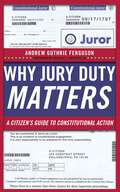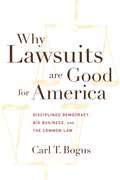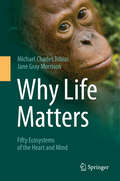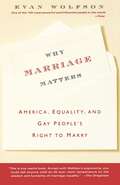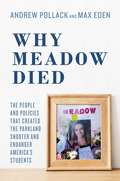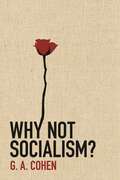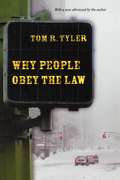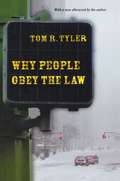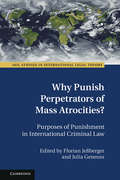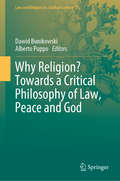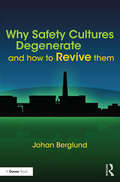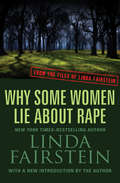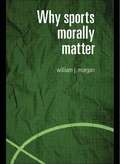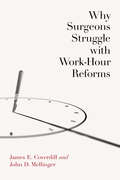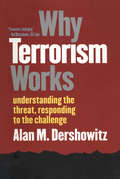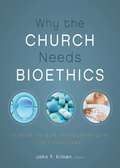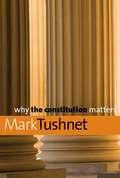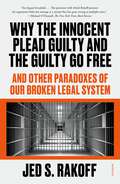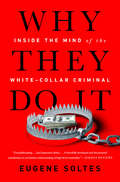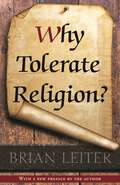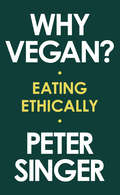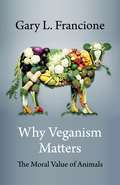- Table View
- List View
Why Jury Duty Matters: A Citizen's Guide to Constitutional Action
by Andrew Guthrie FergusonAn argument for the constitutional responsibility to participate in jury dutyIt’s easy to forget how important the jury really is to America. The right to be a juror is one of the fundamental rights guaranteed to all eligible citizens. The right to trial by jury helped spark the American Revolution, was quickly adopted at the Constitutional Convention, and is the only right that appears in both the Constitution and the Bill of Rights. But for most of us, a jury summons is an unwelcome inconvenience. Who has time for jury duty? We have things to do.In Why Jury Duty Matters, Andrew Guthrie Ferguson reminds us that whether we like it or not, we are all constitutional actors. Jury duty provides an opportunity to reflect on that constitutional responsibility. Combining American history, constitutional law, and personal experience, the book engages citizens in the deeper meaning of jury service. Interweaving constitutional principles into the actual jury experience, this book is a handbook for those Americans who want to enrich the jury experience. It seeks to reconnect ordinary citizens to the constitutional character of a nation by focusing on the important, and largely ignored, democratic lessons of the jury.Jury duty is a shared American tradition. It connects people across class and race, creates habits of focus and purpose, and teaches values of participation, equality, and deliberation. We know that juries are important for courts, but we don’t know that jury service is important for democracy. This book inspires us to re-examine the jury experience and act on the constitutional principles that guide our country before, during, and after jury service.
Why Lawsuits are Good for America: Disciplined Democracy, Big Business, and the Common Law (Critical America #62)
by Carl T. BogusArgues that lawsuits work far better than commonly understoodJudging by the frequency with which it makes an appearance in television news shows and late night stand up routines, the frivolous lawsuit has become part and parcel of our national culture. A woman sues McDonald’s because she was scalded when she spilled her coffee. Thousands file lawsuits claiming they were injured by Agent Orange, silicone breast implants, or Bendectin although scientists report these substances do not cause the diseases in question. The United States, conventional wisdom has it, is a hyperlitigious society, propelled by avaricious lawyers, harebrained judges, and runaway juries. Lawsuits waste money and time and, moreover, many are simply groundless.Carl T. Bogus is not so sure. In Why Lawsuits Are Good for America, Bogus argues that common law works far better than commonly understood. Indeed, Bogus contends that while the system can and occasionally does produce “wrong” results, it is very difficult for it to make flatly irrational decisions. Blending history, theory, empirical data, and colorful case studies, Bogus explains why the common law, rather than being outdated, may be more necessary than ever. As Bogus sees it, the common law is an essential adjunct to governmental regulation—essential, in part, because it is not as easily manipulated by big business. Meanwhile, big business has launched an all out war on the common law. “Tort reform”—measures designed to make more difficult for individuals to sue corporations—one of the ten proposals in the Republican Contract With America, and George W. Bush’s first major initiative as Governor of Texas. And much of what we have come to believe about the system comes from a coordinated propaganda effort by big business and its allies. Bogus makes a compelling case for the necessity of safeguarding the system from current assaults. Why Lawsuits Are Good for America provides broad historical overviews of the development of American common law, torts, products liability, as well as fresh and provocative arguments about the role of the system of “disciplined democracy” in the twenty-first century.
Why Life Matters
by Michael Charles Tobias Jane Gray MorrisonDr. Michael Charles Tobias and Jane Gray Morrison are world-renowned ecological philosophers and activists, interdisciplinary social and environmental scientists and broad-ranging, deeply committed humanists. This collection of fifty essays and interviews comprises an invigorating, outspoken, provocative and eloquent overview of the ecological humanities in one highly accessible volume. The components of this collection were published in the authors' "Green Conversations" blog series, and pieces in the Eco News Network from 2011 to 2013 and feature luminaries from Jane Goodall to Ted Turner to the Secretary of the Smithsonian Institution to the former head of the UN Convention on Biological Diversity. Stunning color photographs captured by the authors and contributors make Why Life Matters: Fifty Ecosystems of the Heart and Mind a feast for the eyes as well as the mind and soul. Ethics, science, technology, ecological literacy, grass-roots renaissance thinkers, conservation innovation from the U. S. to the U. K. ; from India to Ecuador; from Bhutan to Haiti; from across Africa, the Neo-Tropics, Central Asia and Japan, to Rio, Shanghai and Manhattan - this humanistic ode to the future of life on earth is a relevant and resonating read. Michael Tobias and Jane Gray Morrison, partners who between them have authored some 50 books and written, directed and produced some 170 films, a prolific body of work that has been read, translated and/or broadcast around the world, have been married for more than a quarter-of-a-century. Their field research across the disciplines of comparative literature, anthropology, the history of science and philosophy, ecology and ethics, in over 80 countries, has served as a telling example of what two people - deeply in love with one another - can accomplish in spreading that same unconditional love to others - of all species.
Why Marriage Matters: America, Equality, and Gay People's Right to Marry
by Evan Wolfson"At its core, the freedom-to-marry movement is about the same thing every civil rights struggle has been about: taking seriously our country's promise to be a nation its citizens can make better, its promise to be a place where people don't have to give up their differences or hide them in order to be treated equally."Why Marriage Matters offers a compelling, intelligently reasoned discussion of a question that still remains in the national consciousness. It is the work of one of the most influential attorneys in America, who has dedicated his life to the protection of individuals' rights and our Constitution's commitment to equal justice under the law. Above all, it is a clear, straightforward book that brings into sharp focus the very human significance of the right to marry in America—not just for some couples, but for all. Why is the word marriage so important? Will marriage for same-sex couples hurt the "sanctity" of the institution? How can people of different faiths reconcile their beliefs with the idea of marriage for same-sex couples? How will allowing gay couples to marry affect children? In this quietly powerful volume, the most authoritative and fairly articulated book on the subject, Wolfson demonstrates why the right to marry is important—indeed necessary—for all couples and for America's promise of equality.
Why Meadow Died: The People and Policies That Created The Parkland Shooter and Endanger America's Students
by Max Eden Andrew PollackThe Parkland school shooting was the most avoidable mass murder in American history. And the policies that made it inevitable are being forced into public schools across America.“After my sister Meadow was murdered at Marjory Stoneman Douglas High School, the media obsessed for months about the type of rifle the killer used. It was all clickbait and politics, not answers or justice. That wasn’t good enough for us. My dad is a real tough guy, but Meadow had him wrapped around her little finger. He would do anything she wanted, and she would want him to find every answer so that this never happens again. My dad teamed up with one of America’s leading education experts to launch his own investigation. We found the answers to the questions the media refused to ask. Questions about school safety that go far beyond the national gun debate. And the answers to those questions matter for parents, teachers, and schoolchildren nationwide. If one single adult in the Broward County school district had made one responsible decision about the Parkland shooter, then my sister would still be alive. But every bad decision they made makes total sense once you understand the district’s politically correct policies, which started here in Broward and have spread to thousands of schools across America.” —Hunter Pollack, “Foreword”
Why Not Jail?
by Rena SteinzorThe U.S. Department of Justice is under fire for failing to prosecute banks that caused the 2008 economic meltdown because they are too big to jail. Prosecutors have long neglected to hold corporate executives accountable for chronic mistakes that kill and injure workers and customers. This book, the first of its kind, analyzes five industrial catastrophes that have killed or sickened consumers and workers or caused irrevocable harm to the environment. From the Texas City refinery explosion to the Upper Big Branch mine collapse to the destruction of the Deepwater Horizon oil rig and extending to incidents of food and drug contamination that have killed or injured hundreds, the root causes of these preventable disasters include crimes of commission and omission. Although federal prosecutors have made a start on holding low-level managers liable, far more aggressive prosecution is appropriate as a matter of law, policy, and justice. Written in accessible and jargon-free language, this book recommends innovative interpretations of existing laws to elevate the prosecution of white-collar crime at the federal and state levels.
Why Not Socialism?
by G. A. CohenA compelling case for why it's time for socialismIs socialism desirable? Is it even possible? In this concise book, one of the world's leading political philosophers presents with clarity and wit a compelling moral case for socialism and argues that the obstacles in its way are exaggerated.There are times, G. A. Cohen notes, when we all behave like socialists. On a camping trip, for example, campers wouldn't dream of charging each other to use a soccer ball or for fish that they happened to catch. Campers do not give merely to get, but relate to each other in a spirit of equality and community. Would such socialist norms be desirable across society as a whole? Why not? Whole societies may differ from camping trips, but it is still attractive when people treat each other with the equal regard that such trips exhibit.But, however desirable it may be, many claim that socialism is impossible. Cohen writes that the biggest obstacle to socialism isn't, as often argued, intractable human selfishness—it's rather the lack of obvious means to harness the human generosity that is there. Lacking those means, we rely on the market. But there are many ways of confining the sway of the market: there are desirable changes that can move us toward a socialist society in which, to quote Albert Einstein, humanity has "overcome and advanced beyond the predatory stage of human development."
Why People Obey The Law
by Tom R. TylerPeople obey the law if they believe it's legitimate, not because they fear punishment--this is the startling conclusion of Tom Tyler's classic study. Tyler suggests that lawmakers and law enforcers would do much better to make legal systems worthy of respect than to try to instill fear of punishment. He finds that people obey law primarily because they believe in respecting legitimate authority. In his fascinating new afterword, Tyler brings his book up to date by reporting on new research into the relative importance of legal legitimacy and deterrence, and reflects on changes in his own thinking since his book was first published.
Why People Obey the Law
by Tom R. TylerPeople obey the law if they believe it's legitimate, not because they fear punishment--this is the startling conclusion of Tom Tyler's classic study. Tyler suggests that lawmakers and law enforcers would do much better to make legal systems worthy of respect than to try to instill fear of punishment. He finds that people obey law primarily because they believe in respecting legitimate authority. In his fascinating new afterword, Tyler brings his book up to date by reporting on new research into the relative importance of legal legitimacy and deterrence, and reflects on changes in his own thinking since his book was first published.
Why Prison?
by David ScottPrison studies has experienced a period of great creativity in recent years, and this collection draws together some of the field's most exciting and innovative contemporary critical writers in order to engage directly with one of the most profound questions in penology - why prison? In addressing this question, the authors connect contemporary penological thought with an enquiry that has received the attention of some of the greatest thinkers on punishment in the past. Through critical exploration of the theories, policies and practices of imprisonment, the authors analyse why prison persists and why prisoner populations are rapidly rising in many countries. Collectively, the chapters provide not only a sophisticated diagnosis and critique of global hyper-incarceration but also suggest principles and strategies that could be adopted to radically reduce our reliance upon imprisonment.
Why Punish Perpetrators of Mass Atrocities?: Purposes of Punishment in International Criminal Law (ASIL Studies in International Legal Theory)
by Florian Jeßberger Julia GeneussThis edited volume provides, for the first time, a comprehensive account of theoretical approaches to international punishment. Its main objective is to contribute to the development of a consistent and robust theory of international criminal punishment. For this purpose, the authors - renowned scholars in the fields of criminal law, international criminal law, and philosophy of law, as well as practitioners working at different international criminal courts and tribunals - address the question of meaning and purpose of punishment in international law from various perspectives. The volume fleshes out the predominant dimensions of a theory of international punishment and highlights the differences between 'ordinary' (domestic) crime and international crimes and their respective enforcement. At the same time, throughout the volume a major focus is on the practical consequences of the different theoretical approaches, in particular for the activities of the International Criminal Court.
Why Religion? Towards a Critical Philosophy of Law, Peace and God (Law and Religion in a Global Context #2)
by Dawid Bunikowski Alberto PuppoThis book examines the relation between religion and jurisprudence, God, and peace respectively. It argues that in order to elucidate the possible role religion can play in the contemporary world, it is useful to analyse religion by associating it with other concepts. Why peace? Because peace is probably the greatest promise made by religions and the greatest concern in the contemporary world. Why jurisprudence? Because, quoting Kelsen’s famous book "Peace through Law", peace is usually understood as something achievable by international legal instruments. But what if we replace "Peace through Law" with "Peace through Religion"? Does law, as an instrument for achieving peace, incorporate a religious dimension? Is law, ultimately, a religious and normative construction oriented to peace, to the protection of humanity, in order to keep humans from the violence of nature? Is the hope for peace rational, or just a question of faith? Is religion itself a question of faith or a rational choice? Is the relatively recent legal concept of “responsibility to protect” a secular expression of the oldest duty of humankind?The book follows the structure of interdisciplinary research in which the international legal scholar, the moral philosopher, the philosopher of religion, the theologian, and the political scientist contribute to the construction of the necessary bridges. Moreover, it gives voice to different monotheistic traditions and, more importantly, it analyses religion in the various dimensions in which it determines the authors' cultures: as a set of rituals, as a source of moral norms, as a universal project for peace, and as a political discourse.
Why Safety Cultures Degenerate: And How To Revive Them
by Johan BerglundFrom Chernobyl to Fukushima, have we come full circle, where formalisation has replaced ambiguity and a decadent style of management, to the point where it is becoming counter-productive? Safety culture is a contested concept and a complex phenomenon, which has been much debated in recent years. In some high-risk activities, like the operating of nuclear power plants, transparency, traceability and standardisation have become synonymous with issues of quality. Meanwhile, the experience-based knowledge that forms the basis of manuals and instructions is liable to decline. In the long-term, arguably, it is the cultural changes and its adverse impacts on co-operation, skill and ability of judgement that will pose the greater risks to the safety of nuclear plants and other high-risk facilities. Johan Berglund examines the background leading up to the Fukushima Daiichi accident in 2011 and highlights the function of practical proficiency in the quality and safety of high-risk activities. The accumulation of skill represents a more indirect and long-term approach to quality, oriented not towards short-term gains but (towards) delayed gratification. Risk management and quality professionals and academics will be interested in the links between skill, quality and safety-critical work as well as those interested in a unique insight into Japanese culture and working life as well as fresh perspectives on safety culture.
Why Some Women Lie About Rape (From the Files of Linda Fairstein #6)
by Linda FairsteinA legal expert&’s investigation of why some women falsely claim rape, and the devastating effects on those who have been wrongfully accused. For each criminal category, a small percentage of claims are proven to be unfounded. Unfortunately, cases of rape are no exception. As a district attorney in New York City, Linda Fairstein encountered these false claims more than a few times. This kind of accusation not only results in the unjust punishment of innocent men, but also serves to trivialize the experiences of rape survivors. In Why Some Women Lie About Rape,Fairstein draws upon her decades of experience to shed light on this difficult issue, including the motivations behind a false rape accusation. Originally published in Cosmopolitan, this essay is now available in digital format for the first time and features a new introduction by the author.
Why Sports Morally Matter (Routledge Critical Studies in Sport)
by William MorganWhen we accept that advertisers and sponsors dictate athletic schedules, that success in sport is measured by revenue, that athletes’ loyalties lie with their commercial agents instead of teams and that game rules exist to be tested and broken in the pursuit of a win, what does our regard for sport say about the moral and political well-being of our society? Why Sports Morally Matter is a deeply critical examination of pressing ethical issues in sports – and in society as a whole. Exploring the broad historical context of modern America, William J. Morgan argues that the current state of sports is a powerful indictment of our wealth-driven society and hyper-individualistic way of life. Taking on critics from all sides of the political debate, Morgan makes the case that, despite the negating effect of free market values, sport still possesses important features that encourage social, moral and political values crucial to the flourishing of a democratic polity. It is this potential to transform society and the individual that makes sport a key battleground in the struggle for the moral soul of twenty-first century America.
Why Surgeons Struggle with Work-Hour Reforms
by James E. Coverdill John D. MellingerOn July 1, 2003, work-hour reforms were enacted nationally for the roughly 129,000 resident physicians in the United States. The reforms limit weekly work hours (a maximum of eighty per week) and in-hospital call (no more than once every three nights), mandate days free of clinical and educational obligations (one day in seven), and regulate other aspects of resident work life.Why Surgeons Struggle with Work-Hour Reforms focuses on general surgeons, a historically long-hour specialty, who fiercely opposed the reforms and are among the least compliant. Why do surgeons struggle with the reforms? Why do they continue to work long hours and view the act of doing so as reasonable if not quintessentially professional? Although the analysis is situated in the growing scientific literature on the consequences of fatigue, the authors do not adjudicate between the claims of surgeons and reform advocates about the effects of long work hours on patient or provider safety. Rather, the aim is to explore and explain how aspects of the occupational culture of surgeons and the social organization of surgical training and practice interlock to impede the reforms.
Why Terrorism Works
by Alan M. DershowitzThe greatest danger facing the world today, says Alan M. Dershowitz, comes from religiously inspired, state sponsored terrorist groups that seek to develop weapons of mass destruction for use against civilian targets. In his newest book, Dershowitz argues passionately and persuasively that global terrorism is a phenomenon largely of our own making and that we must and can take steps to reduce the frequency and severity of terrorist acts.Analyzing recent acts of terrorism and our reaction to them, Dershowitz explains that terrorism is successful when the international community gives in to the demands of terrorists-or even tries to understand and eliminate the "root causes" of terrorism. He discusses extreme approaches to wiping out international terrorism that would work if we were not constrained by legal, moral, and humanitarian considerations. And then, given that we do operate under such constraints, he offers a series of proposals that would effectively reduce the frequency and severity of international terrorism by striking a balance between security and liberty.
Why the Church Needs Bioethics: A Guide to Wise Engagement with Life’s Challenges
by John F. KilnerIn a world where incredible medical technologies are possible … does “can do” mean “should do”? Why the Church Needs Bioethics helps you understand and constructively engage bioethical challenges with the resources of Christian wisdom and ministry. Three rich and true-to-life case studies illustrate the urgency of such bioethical issues as reproductive and genetic technologies, abortion, forgoing treatment, assisted suicide, stem cell research, and human enhancement technologies. Leading Christian voices bring biblical and theological perspective to bear on the incredible medical technologies available today; mobilize useful insights from health care, law, and business; and demonstrate the powerful ways the church can make a difference through counseling, pastoral care, intercultural ministry, preaching, and education. This book equips students, church and lay leaders, and people in health-related fields with the knowledge to make faithful bioethical decisions and to help foster a world where human beings are shown respect as people created in the image of God. Contributors to Why the Church Needs Bioethics include leading Bible and theology scholars, such as D. A. Carson and Kevin Vanhoozer; leaders in the areas of preaching (Greg Scharf) and ethics (Scott Rae); and 15 other experts in the fields of biblical-theological studies, ministry, communication, business, law, healthcare, and bioethics.
why the constitution matters
by Mark TushnetIn this surprising and highly unconventional work, Harvard law professor Mark Tushnet poses a seemingly simple question that yields a thoroughly unexpected answer. The Constitution matters, he argues, not because it structures our government but because it structures our politics. He maintains that politicians and political parties--not Supreme Court decisions--are the true engines of constitutional change in our system. This message will empower all citizens who use direct political action to define and protect our rights and liberties as Americans. Unlike legal scholars who consider the Constitution only as a blueprint for American democracy, Tushnet focuses on the ways it serves as a framework for political debate. Each branch of government draws substantive inspiration and procedural structure from the Constitution but can effect change only when there is the political will to carry it out. Tushnet's political understanding of the Constitution therefore does not demand that citizens pore over the specifics of each Supreme Court decision in order to improve our nation. Instead, by providing key facts about Congress, the president, and the nature of the current constitutional regime, his book reveals not onlywhythe Constitution matters to each of us but also, and perhaps more important,howit matters.
Why the Innocent Plead Guilty and the Guilty Go Free: And Other Paradoxes of Our Broken Legal System
by Judge Jed S. RakoffA senior federal judge’s incisive, unsettling exploration of some of the paradoxes that define the judiciary today, Why the Innocent Plead Guilty and the Guilty Go Free features essays examining why innocent people plead guilty, why high-level executives aren’t prosecuted, why you won’t get your day in court, and why the judiciary is curtailing its own constitutionally mandated power.How can we be proud of a system of justice that often pressures the innocent to plead guilty? How can we claim that justice is equal when we imprison thousands of poor Black men for relatively modest crimes but rarely prosecute rich white executives who commit crimes having far greater impact? How can we applaud the Supreme Court’s ever-more-limited view of its duty to combat excesses by the president?The federal judge Jed S. Rakoff, a leading authority on white-collar crime, explores these and other puzzles in Why the Innocent Plead Guilty and the Guilty Go Free, a startling account of our broken legal system. Grounded in Rakoff’s twenty-four years as a federal trial judge in New York in addition to the many years he worked as a federal prosecutor and criminal defense lawyer, Rakoff ’s assessment of our justice system illuminates some of our most urgent legal, social, and political issues: plea deals and class-action lawsuits, corporate impunity and the death penalty, the perils of eyewitness testimony and forensic science, the war on terror and the expanding reach of the executive branch. A fundamental problem, he reveals, is that the judiciary is constraining its own constitutional powers.Like few others, Rakoff understands the values that animate the best aspects of our legal system—and has a close-up view of our failure to live up to these ideals. But he sees within this gap great opportunities for practical reform, and a public mandate to make our justice system truly just.
Why They Do It: Inside the Mind of the White-Collar Criminal
by Eugene SoltesFrom the financial fraudsters of Enron, to the embezzlers at Tyco, to the insider traders at McKinsey, to the Ponzi schemer Bernie Madoff, the failings of corporate titans are regular fixtures in the news. But what drives wealthy and powerful people to white-collar crime? Harvard Business School professor Eugene Soltes draws from extensive personal interaction and correspondence with nearly fifty former executives as well as the latest research in psychology, criminology, and economics to investigate how once-celebrated executives become white-collar criminals. The product of seven years in the company of the men behind the largest corporate crimes in history, Why They Do It is a breakthrough look at the dark side of the business world.Soltes reveals how the usual explanations fail to tell the whole story of why many seemingly successful people go over the line. White-collar criminals are not merely driven by excessive greed or hubris, nor do they usually carefully calculate costs and benefits before breaking the law. Instead, Soltes shows that most of the executives who committed crimes made decisions the way we all do—on the basis of their intuitions and gut feelings. The trouble is that these gut feelings are often poorly suited for the modern business world where leaders are increasingly distanced from the consequences of their decisions and the individuals they impact.The extraordinary costs of corporate misconduct are clear to its victims. Yet, never before have we been able to peer so deeply into the minds of the many prominent perpetrators of white-collar crime. With the increasing globalization of business threatening us with even more devastating corporate misconduct, the lessons Soltes draws in Why They Do It are needed more urgently than ever.
Why Tolerate Religion?: Updated Edition
by Brian LeiterWhy it's wrong to single out religious liberty for special legal protectionsThis provocative book addresses one of the most enduring puzzles in political philosophy and constitutional theory—why is religion singled out for preferential treatment in both law and public discourse? Why are religious obligations that conflict with the law accorded special toleration while other obligations of conscience are not? In Why Tolerate Religion?, Brian Leiter shows why our reasons for tolerating religion are not specific to religion but apply to all claims of conscience, and why a government committed to liberty of conscience is not required by the principle of toleration to grant exemptions to laws that promote the general welfare.
Why Torture Doesn't Work: The Neuroscience of Interrogation
by Shane O'MaraBesides being cruel and inhumane, torture does not work the way torturers assume it does. As Shane O'Mara's account of the neuroscience of suffering reveals, extreme stress creates profound problems for memory, mood, and thinking, and sufferers predictably produce information that is deeply unreliable, or even counterproductive and dangerous.
Why Vegan?: Eating Ethically (Penguin Great Ideas Ser.)
by Peter SingerIn a world reeling from a global pandemic, never has a treatise on veganism—from our foremost philosopher on animal rights—been more relevant or necessary. “Peter Singer may be the most controversial philosopher alive; he is certainly among the most influential.” —The New Yorker Even before the publication of his seminal Animal Liberation in 1975, Peter Singer, one of the greatest moral philosophers of our time, unflinchingly challenged the ethics of eating animals. Now, in Why Vegan?, Singer brings together the most consequential essays of his career to make this devastating case against our failure to confront what we are doing to animals, to public health, and to our planet. From his 1973 manifesto for Animal Liberation to his personal account of becoming a vegetarian in “The Oxford Vegetarians” and to investigating the impact of meat on global warming, Singer traces the historical arc of the animal rights, vegetarian, and vegan movements from their embryonic days to today, when climate change and global pandemics threaten the very existence of humans and animals alike. In his introduction and in “The Two Dark Sides of COVID-19,” cowritten with Paola Cavalieri, Singer excoriates the appalling health hazards of Chinese wet markets—where thousands of animals endure almost endless brutality and suffering—but also reminds westerners that they cannot blame China alone without also acknowledging the perils of our own factory farms, where unimaginably overcrowded sheds create the ideal environment for viruses to mutate and multiply. Spanning more than five decades of writing on the systemic mistreatment of animals, Why Vegan? features a topical new introduction, along with nine other essays, including: • “An Ethical Way of Treating Chickens?,” which opens our eyes to the lives of the birds who end up on so many plates—and to the lives of their parents; • “If Fish Could Scream,” an essay exposing the utter indifference of commercial fishing practices to the experiences of the sentient beings they scoop from the oceans in such unimaginably vast numbers; • “The Case for Going Vegan,” in which Singer assembles his most powerful case for boycotting the animal production industry; • And most recently, in the introduction to this book and in “The Two Dark Sides of COVID-19,” Singer points to a new reason for avoiding meat: the role eating animals has played, and will play, in pandemics past, present, and future. Written in Singer’s pellucid prose, Why Vegan? asserts that human tyranny over animals is a wrong comparable to racism and sexism. The book ultimately becomes an urgent call to reframe our lives in order to redeem ourselves and alter the calamitous trajectory of our imperiled planet.
Why Veganism Matters: The Moral Value of Animals (Critical Perspectives on Animals: Theory, Culture, Science, and Law)
by Gary FrancioneMost people care about animals, but only a tiny fraction are vegan. The rest often think of veganism as an extreme position. They certainly do not believe that they have a moral obligation to become vegan.Gary L. Francione—the leading and most provocative scholar of animal rights theory and law—demonstrates that veganism is a moral imperative and a matter of justice. He shows that there is a contradiction in thinking that animals matter morally if one is also not vegan, and he explains why this belief should logically lead all who hold it to veganism. Francione dismantles the conventional wisdom that it is acceptable to use and kill animals as long as we do so “humanely.” He argues that if animals matter morally, they must have the right not to be used as property. That means that we cannot eat them, wear them, use them, or otherwise treat them as resources or commodities.Why Veganism Matters presents the case for the personhood of nonhuman animals and for veganism in a clear and accessible way that does not require any philosophical or legal background. This book offers a persuasive and powerful argument for all readers who care about animals but are not sure whether they have a moral obligation to be vegan.
